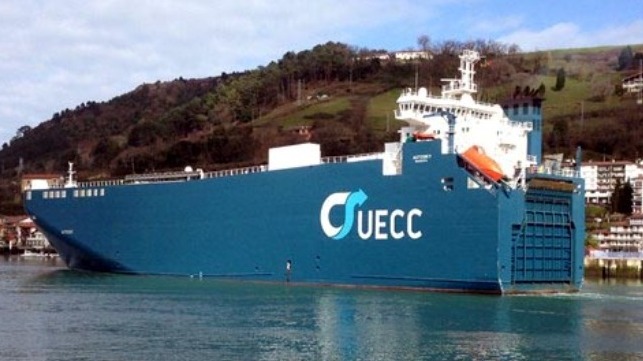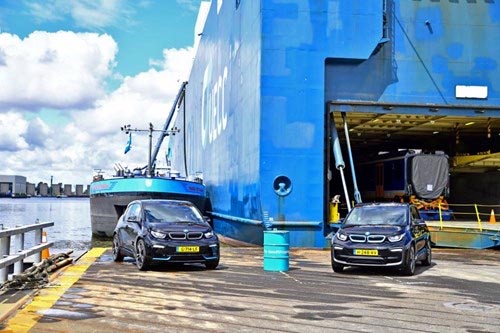UECC Reduced Carbon Intensity by Half in 12 Month Biofuel Test

After a year of operating a car carrier in regular service using biofuel instead of conventional fuel, short-sea ro-ro operator UECC is reflecting on the success of the operation. UECC reports that during the year-long program it was able to reduce carbon intensity by more than half.
“The results are striking,” reports Daniel Gent, Energy & Sustainability Manager for UECC. “A reduction of over 20 million kilograms of CO2 emissions. That equates to an absolute reduction of more than 9,000 kilos of sulfur oxide emissions and a similarly total reduction in particulate matter.”
Launched in March 2020, the joint trial involved the 6,500 dwt car carrier Autosky operating entirely on biofuel supplied by GoodFuels. The 459-foot long vessel, which has a capacity of 2,080 vehicles, received its first bunkering with the biofuel in the Port of Rotterdam on March 16 and maintained its normal route between Zeebrugge, Belgium and Santander, Spain.
Based on the early success of the trial, BMW Group joined with UECC and GoodFuels in June 2020 to extend the program, which originally had been planned to operate for just three months. By covering the fuel premium for a biofuel corresponding to BMW’s Group’s freight shipped on the Autosky, BMW was able to claim the CO2 emission which was expected to range between 80 and 90 percent or more than 400 tons of carbon.

BMW vehicles with the Autosky and GoodFuels bunker vessel (UECC)
The switch to these biofuels UECC reports required little to no technical modifications on the vessel and the fuel has been handled onboard by the company’s expert engineers without any issue. In total, more than 6,000 metric tons of biofuel have been used in the past 12 months.
The fuel itself, which was all supplied by GoodFuels, has been derived from a variety of feedstocks, including processed used cooking oil. All of the biofuel used over the 12 months was sustainably sourced and has utilized waste and residues with no higher quality application available.
To put the results into context and highlight what it means for its customers, UECC provided data on the Carbon Intensity of the Autosky on a grams of CO2 per ton-km basis:
2018:- 85.51 gCO2/tkm
2019:- 85.62 gCO2/tkm
2020:- 35.96 gCO2/tkm
“That’s a 58 percent reduction in Carbon Intensity!” points out Gent. “Keep in mind that the Initial IMO GHG Strategy aims to reduce carbon intensity by 40 percent by 2030 and you can see that UECC is really in front of this ambitious objective!”
For more information about UECC and its operations please visit the company online.
The opinions expressed herein are the author's and not necessarily those of The Maritime Executive.

